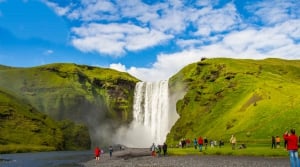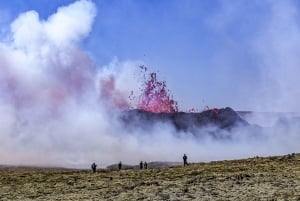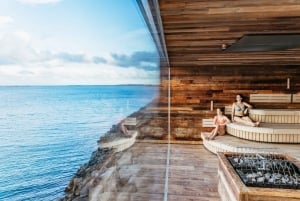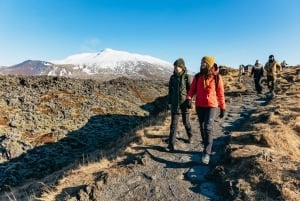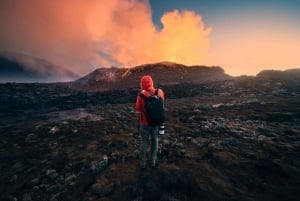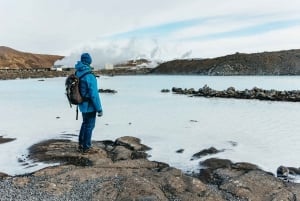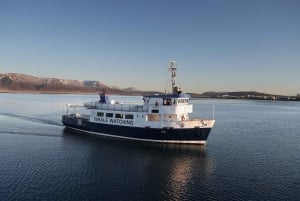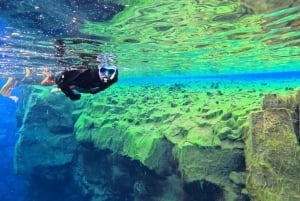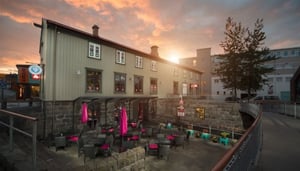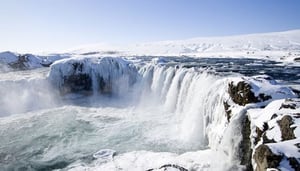Iceland
Iceland is an island in the North Atlantic Ocean. It is best divided into 5 sections, North, South, East, West, and the Westfjords. Iceland is pretty big, so if you're staying in one part of the country and you want to see more than one thing in another part, you probably want to stay overnight.
One of the main characteristics of Iceland is its stunning nature and beautiful landscapes. Iceland has a mountainous, rather barren landscape, and its coastline is marked by many fjords and inlets. It has many unusual geographical features such as geysers, waterfalls, mountains, rivers, volcanoes, glaciers and other natural wonders.
The island's unique geography offers amazing opportunities for extreme outdoor adventures such as hiking, skiing, river rafting, whale watching, golfing, horseback riding, fishing, scuba diving and much, much more. The ancient history and rich culture of the nation offers amazing fascinating museum experiences and cultural events.
The island's northerly position, just shy of the Arctic Cirlce, means that it is home many glaciers, among them Vatnajökull, the largest icecap in Europe. It also means that you can experience the Northern Lights in the wintertime and the Midnight sun in the summertime. Despite being so far north, its climate is extremely temperate, moderated by the Gulf Stream.
Iceland is located on a geothermal hot spot which gives rise to many unique sights, such as volcanoes, natural hot springs and geysers. It also means all Icelandic homes are heated with hot water pumped straight from the ground. Coupled with the abundant hydoelectricity, Iceland as some of the cleanest energy in the world. There are many natural hot springs you can bathe in, and Icelandic culture has a strong tradition of heated public swimming pools. In many small towns, the local pool becomes an unofficial center of gathering and socializing.
Iceland is a developed country with excellent infrastructure, so getting around is never an issue. It offers fabulous restaurants, a hopping night life, as well as opportunities for shopping for unique Icelandic design, or just lounging in about in charming towns and luxury hotels.
ReykjavÃk, in the south-west part of the country, is the northernmost capital in the world and by far the largest city of Iceland. Akureyri, the main city in the North, is the second largest. The biggest town in the East of Iceland is Egilsstaðir. The main hubs of activity in the southern part of the island are VÃk, and the islands of Vestmannaeyjar. The biggest community in the Westfjords is Ãsafjörður. The Westfjords has the most difficult terrain in Iceland and some towns there can only be accessed by boat or airplane. Every part of the country has exciting activites, adventure tours, unique landmarks, and fascinating local events in their charming scattered towns.
Icelandic is the official language of Iceland. It's a north Germanic language derived from old Norse, and hasn't changed much throughout the centuries. Judging by ancient Icelandic literature, it's almost the same today as it was back then. Most Icelanders speak English very well, and many of them can speak Danish or another Scandinavian language.
Iceland has an extremely rich history, reaching back to when it was settled in 871 AD. The Vikings who populated the island were excellent seafarers who established settlements in Greenland and discovered America. Icelandic history is written down in ancient Icelandic literature, notably the sagas and eddas. They were written during the high and late middle ages and are unique in Northern Europe for their age and quality of preservation.
The music scene in Iceland is very alive and vibrant. Icelandic contemporary music consists of a big group of bands. You might even think that all Icelanders had musical education, because it seems like everyone is in a band or about to form one. Many Icelandic mucisians have caught attention overseas, such as Múm, Sugarcubes, Sigur Rós, Emiliana Torrini, Björk, GusGus, and most recently Of Monsters and Men. Iceland Airwaves music festival is without a doubt the Icelandic music harvest festival.
Much of Icelandic food is based on fish, lamb and dairy products. Traditional Icelandic food is admittedly⦠different. Ãorramatur is the traditional Icelandic cusine. It consists of many dishes, such as skyr, cured shark, cured ram, singed sheep heads and black pudding. Donât get discouraged, itâs not as bad as it sounds. Itâs usually only consumed around the month of Ãorri, which starts in January and ends in February.
Icelanders pride themselves on their independence and self-sufficiency. They are also quite progressive when it comes to human rights, especially regarding lesbian, gay, bisexual and transgendered matters. Same-sex couples have all the same rights as different-sex couples do in Iceland since June 2010 and Iceland had the world's first openly lesbian head of state when Jóhanna Sigurðardóttir was elected prime minister in 2009.
A large majority of Icelanders are members of the Lutheran State Church, or about 80%. Another 5% of the nation are registered in other Christian denominations and almost 5% practice the traditional Norse religion Ãsatrú.
The main traditional sport in Iceland is GlÃma, a form of wrestling thought to have originated in medieval times. How cool is that? Handball is however sometimes said to be the national sport, as the Icelandic handball team is one of the best teams in the world.
There are countless interesting things to learn about Iceland. Look around the site to learn more, or just book your trip now and see for yourself!
Videos of Iceland:
Inspired by Iceland Video from Inspired By Iceland on Vimeo.
Iceland, Eyjafjallajökull - May 1st and 2nd, 2010 from Sean Stiegemeier on Vimeo.
Midnight Sun | Iceland from SCIENTIFANTASTIC on Vimeo.
BON IVER "Holocene" from nabil elderkin on Vimeo.


